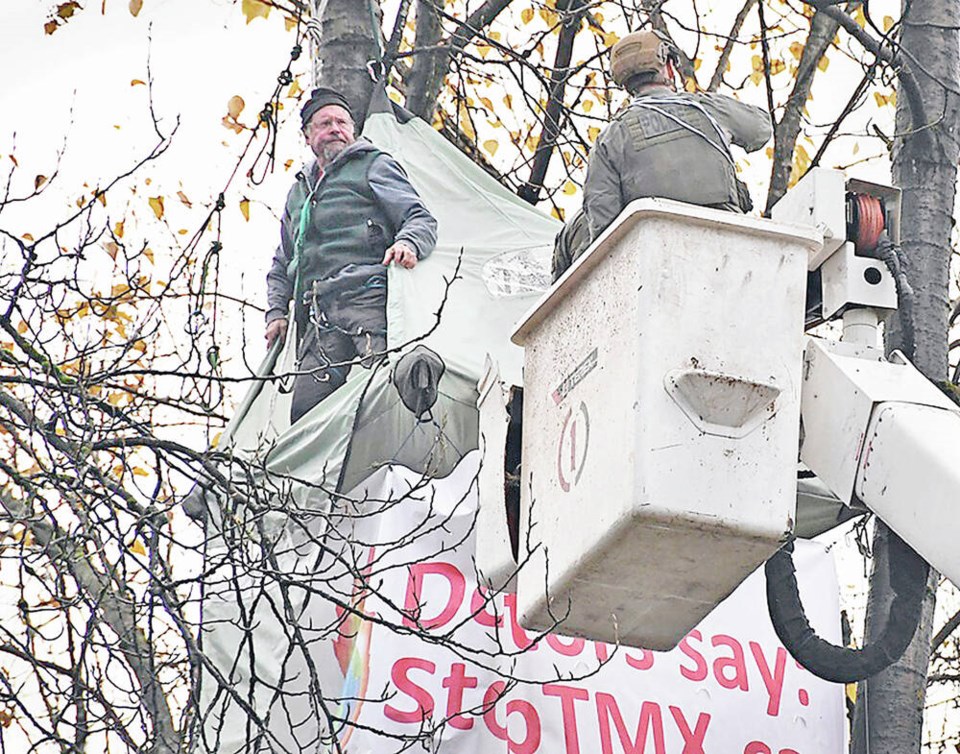On June 15, my friend and colleague Tim Takaro was sentenced to 30 days in jail. "So what?" you might say. "Lots of people go to jail." True, but you need to know that Tim is, like me, a physician and has just retired from his position as a professor of health sciences at Simon Fraser University. He was jailed for trying to protect the health of the public through an act of non-violent civil disobedience — trying to block the Trans Mountain pipeline expansion by sitting in a tree.
Tim is “a physician-scientist trained in occupational and environmental medicine, public health and toxicology”, to quote from his SFU biography. His primary research is focused on the health impacts of global heating, and he has completed two major reports on the health impacts of the Trans Mountain.
Like many physicians these days, he is very concerned about the health, social and ecological impacts of climate change. What he knows about these health impacts — including the health impacts of the Trans Mountain — concerns him so much he took those extra, brave steps into peaceful civil disobedience.
When Tim camped in that tree along the Brunette River in Burnaby, in November 2021, he was defying an injunction awarded by the sa╣·╝╩┤½├Į Supreme Court to the Trans Mountain project. So he was arrested, and subsequently pleaded guilty, leading to his sentencing.
But Tim was doing exactly what an ethical physician should do: defending the health of Canadians and people around the world. For Tim, as a public health physician, the “patient” is the community as a whole, and the harm he sought to prevent is the further expansion of fossil fuel use. As he said on CBC Radio‘s Early Edition on June 13: “Increasing emissions will kill more people.”
The Code of Ethics of the Canadian Medical Association is clear: Physicians should “always act to benefit the patient and promote the good of the patient” and “take all reasonable steps to prevent or minimize harm to the patient”. A 2019 World Medical Association Declaration states that when the law and medical ethics conflict, “ethical responsibilities supersede legal obligations.”
Let us be clear: Climate change — actually, human-induced climate heating resulting in climate instability and chaos — is a danger to health. The World Health Organization has said “climate change is the greatest threat to health in the 21st century.” UN Secretary General Antonio Guterres, responding to an Intergovernmental Panel on Climate Change report last August, declared a “code red for humanity”. In April this year, commenting on the latest new IPCC report, Guterres described countries that increase fossil fuel production as “dangerous radicals,” saying: “Investing in new fossil fuels infrastructure is moral and economic madness.”
He doubled down on that criticism on June 17 speaking at the Major Economies Forum. He accused the fossil fuel industry of investing “heavily in pseudoscience and public relations — with a false narrative to minimise their responsibility for climate change and undermine ambitious climate policies.” In doing so, he added, “they exploited precisely the same scandalous tactics as big tobacco decades before.”
His criticism extended to the governments that aid and abet the expansion of the fossil fuel sector, saying: “Nothing could be more clear or present than the danger of fossil fuel expansion. Even in the short-term, fossil fuels don’t make political or economic sense.”
The Trans Mountain is being built by the Government of sa╣·╝╩┤½├Į — which means by us — in order to expand production and export of oil from Alberta. In doing so, the government is acting as a dangerous radical, contributing to climate change and harming people, which is or ought to be a crime, and the courts are protecting that behaviour. Even worse, they are making all of us, as owners of the pipeline, accomplices, which I resent.
I accept that the judge and the legal system are correct in their interpretation and application of the law and Tim is on the wrong side of the law. But in the wider sense of what is right for people and the planet, he is on the right side and the government and the courts are on the wrong side of both morality and history.
Dr. Trevor Hancock is a retired professor and senior scholar at the University of Victoria’s School of Public Health and Social Policy.



